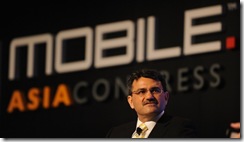It is expected that Bharti Airtel shall unveil a new brand for its 15 Zain Africa assets by the end of October. If the process to introduce and market a new corporate and brand identity was not enough of a challenge in itself, Bharti Airtel is also faced with the added complexity of dismantling the Zain brand without losing any of the African optimism and dynamism it represented
Manoj Kohli and his management team face a number of challenges in growing the business in Africa, and would do well to listen and learn before leaping to any new strategic directions (Getty Images)
On August 1, 2008 the Zain brand was simultaneously introduced across 14 countries in Africa, for the main part superseding the Celtel International mantra in most markets. The rebranding was described as a triumph for emerging market ambitions, which combined international aspirations with local expertise and interests.
Zain was set to represent ‘heart, radiance, and belonging’ in Africa, though almost two years to the month this badge is set to be stripped down and replaced by the brand currently being formulated by Zain Africa’s new proprietors, Bharti Airtel.
It marks a monumental shift in brand ethos; given Zain Group’s ideology was built on the corporate aspirations of being a global player with impeccable strategic credentials. Bharti Airtel on the other hand represents an emerging market powerhouse that is celebrated for being able to make money in the perilously competitive and relatively low average revenue, low margin market that is India. Bharti Airtel has mastered the harnessing of a huge subscriber base that exceeds 130 million in its home market, and is expected to bring this competence to play in Africa.
“What we are basically doing is taking an African success story, which was Celtel, and taking it global,” commented Chris Gabriel, Zain Africa’s CEO back in 2008.
In June it was reported that a 40-member management team from Bharti Airtel, headed by its CEO for international operations, Manoj Kohli had relocated to the Kenyan capital Nairobi, the city chosen by the Indian operator to base its African headquarters. This management team is believed to be working with Zain’s country management in the individual markets, though the overall management style and level of centralisation of key decision-making functions and processes is yet to be publicised.
Kohli is quoted as saying Bharti Airtel is looking to offer ‘affordable’ rates in Africa, adopting a strategy similar to the one it has deployed in India; where the operator has never initiated a price reduction; but instead has always followed.
It has been speculated by press in India that Bharti Airtel intends to employ up to100 executives at its headquarters, who will have responsibility for coordinating the strategic efforts across the continent.
Consistency in both the service provided as well as the aspirational context of the brand are elements Bharti Airtel will have to face up to as it looks to re-engineer the African assets in the Indian operator’s likeness. In June Ogilvy Africa, part of the global marketing communications services group WPP, was appointed the agency to provide overall creative direction, media planning and buying for Bharti Airtel’s African businesses, besides executing campaigns in each of the African markets.
Ogilvy Africa was previously engaged by Zain for planning and media buying across Africa and the agency has gone as far as establishing a specialist pan-African business unit called Team Airtel. This team will exclusively deliver integrated marketing services – advertising, media buying, market research and public relations – to Bahrti Airtel across the continent with its existing network of offices.
The unit will incorporate The Brand Union, responsible for brand migration; Millward Brown for market research; along with Hill & Knowlton and Ogilvy PR for all public relations across all markets.
Prior to the acquisition, Zain Africa gained significant publicity through the introduction of its One Network roaming service, which offered the opportunity to communicate freely across geographical boarders without incurring roaming call surcharges and without having to pay to receive incoming calls. It was a proposition that resonated well with Zain Africa’s mission to be viewed as an operator for the people, though it is understood that One Network as business concern has been faced with severe challenges.
The platform exists for Bharti Airtel to continue the One Network operation, though whether the Indian operator will be inclined to do so given the service’s negative impact on international and roaming revenues remains to be seen. It will also be interesting to see whether any move away from the offer of One Network services will lead to any sort of backlash for the new owners of Zain Africa.
In August 2008, Zain Group extended its brand to its African assets in a move that was meant to symbolise the unity of operations across continents (Picture sourced from Zain Africa)
Beyond the strategic challenges that shall be faced by Bharti Airtel in Africa, there are pressing financial and operational challenges that exist on the continent. Zain Africa produced a net loss of US$124 million for the full-year 2009, down from an US$11 million net profit in 2008. In its 2009 earnings report, Zain Group acknowledged that the operator had experienced several setbacks in its financial performance during the year as compared to the previous one.
That’s not to say the performance of its African assets was all that good in 2008. Nigeria, for example, was Zain Group’s largest single operation by subscriber numbers, and counted 17.197 million users at the end of 2008. It also contributed the most revenue of any single Zain operation in 2008, amounting to US$1.64 billion, though it ranked 13th out of Zain Group’s 22 operational entities at the end of 2008 in terms of net income contribution for the year. Net income in Nigeria amounted to just US$20.5 million that year.
Kuwait, on the other hand, which counted around one tenth the number of subscribers at the end of 2008 than Nigeria’s base, produced 31 times the net income Zain Nigeria achieved. In 2008, net losses in Africa were incurred by Kenya (US$89.3 million loss), Ghana (US$61.3 million loss), Uganda (US$22.4 million loss), Madagascar (US$19.4 million loss) and Sierra Leone (US$1.6 million loss), and given the potential of African currencies to continue weakening against the US dollar, there is a chance such results will not witness a reversal anytime soon.
Thus while Zain Africa’s revenues accounted for 46 per cent of the group’s total revenues in 2009, the region’s net loss greatly contributed to the group’s 39 per cent decline in net profit that year .
An additional challenge Bharti Airtel is set to face in Africa is a much more subtle one, but one which still has a significant role to play. It is the question of culture. An Indian community has existed in Africa for many centuries now, dating back to the era of the Silk Route, though despite this history, a view persists amongst many ordinary Africans that Indians are not as well integrated into local communities as they ought to be.
Bharti Airtel would do well to offer its African operations some level of autonomy by which the Indian operator may be seen to be giving a guiding hand, without it being viewed as Indian interests imposing on African operations.
Zain Group claims to have pumped in the region of US$6 billion in CAPEX into its African operations between 2005 and the end of last year, and given Bharti Airtel’s whole-hearted embrace of the network outsourcing model, it remains to be seen whether ot sweeping changes will be instituted with regards how the networks across Africa shall be operated.





0 comments ↓
There are no comments yet...Kick things off by filling out the form below.
Leave a Comment